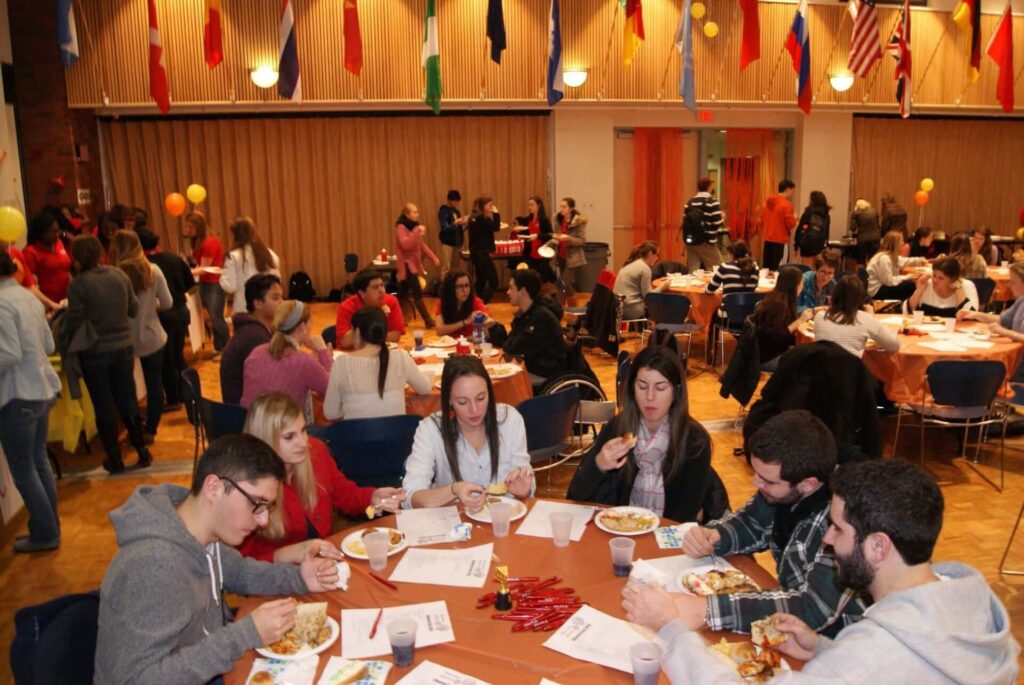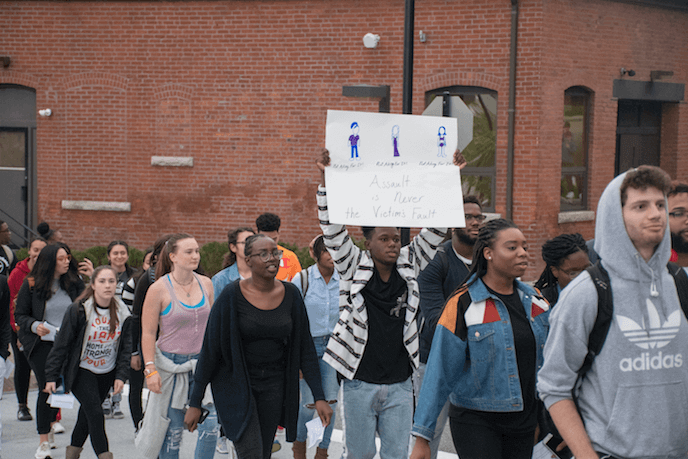Tag: Angela Bueso ’22
Tangents and Tirades
by The Cowl Editor on February 28, 2019
Opinion

Extra-Murals: Make Intramurals Casual Again
Joining an intramural team is usually a fantastic way to be active, socialize, and try to win the infamous league T-shirt for the sports’ best team or players. While it can be fun and games (excuse the pun), sometimes getting beaten mercilessly by dodgeballs can take part of the amusement away.
Some teams can be in it to win it all, and they recruit the best of the best, even varsity and club athletes. Stacking teams in this way, mixed with sheer competitiveness, results in an utter beatdown and demolishment of the other teams.
For those teams and players that join for enjoyment only, getting pummelled, despite one’s best efforts, detracts from the meaning and overall experience of intramural sports.
For the more popular sports, like ultimate frisbee or soccer, two leagues are offered. The A league is more competitive, while the B league is more for recreation. While this works in theory, some athletes join the B league for less competition and easier wins. And in less popular sports, no division exists at all.
A solution to this problem could be the introduction of an option when registering a team that identifies it as competitive or non-competitive. The teams can still play in the same league, but know what to expect when game time comes.
A more competitive team can play with less ferocity, managing to gain the win without compromising the honor of the opposing team. The non-competitive team will fully achieve its goal of enjoyment without the embarrassment of a total loss.
—Elizabeth McGinn ’21
10 p.m. Mass Time: A (Mass)ive Improvement
Chaplain changed the classic, school-wide favorite 10:30 p.m. Sunday Mass to 10 p.m., due to a survey they asked students to participate in during the previous spring semester.
While 30 minutes may not seem like a substantial difference, the 10 p.m. Mass is far better than the 10:30 p.m. Mass time and saves students a considerable amount of time to sleep and finish up school work for the week ahead.
The 10:30 p.m., now 10 p.m., Mass has always been a student favorite. At this Mass, one should expect the chapel to be packed with fellow Friars, a chorus’ of amazingly talented student singers and instrumentalists, a beautiful homily, and, of course, post-Mass bash.
So, of course, there is a strong reason why PC students prefer the later Mass time over the other options. PC student Maddie Reilly ’20 describes 10 p.m. Mass as “a truly awesome way to end your weekend and start your week.”
Sunday nights are always daunting for students as they are cramming their work in for the week to come while also trying to catch up on some sleep. The chance to get an extra 30 minutes of sleep or extra time to do work before heading to bed is crucial for college students after a busy weekend.
While some may argue that the 10:30 p.m. Mass gives students more time to finish their work before Mass, so far almost a year into this change of timing, the majority of PC students seem to have a favorable opinion of this earlier Mass time and would like it to remain this way.
If you or any of your friends have never been to 10 p.m. Mass, be sure to check it out and see what all the hype is all about.
—Marie Sweeney ’20
Procrastination Is Not the Key to Success
With two midterms, papers, and analyses, last week was hectic to say the least. This overwhelming feeling of every line in our agendas being full and the constant feeling of unrest are relatable to many college students.
Another feeling the vast majority of students can relate to is procrastination. In your head you say, I know I have to do this; but do I have to do it now?
It almost seems as if for some people, or at least myself, the more I have to do, the more I find myself leaving everything until the last minute. This results in incessant stress that builds inside us.
You are not calm because you know you have to do something, but you are stressed because you are not doing it. This could have an easy solution that could abruptly terminate your tension.
Start doing the work early. And by early I do not mean early the day it is due, but early as in five days before.
As an innate procrastinator, I know the struggle. Something inside you pulls your body into your bed as soon as you want to start working on that paper or studying for that midterm.
You try to fool yourself by saying, I really do work better under pressure. Some people can procrastinate, but I am not one of them.
As true as these words may be, I would invite you to ask yourself, is procrastinating really worth all the stress?
You are going to end up doing it anyways. Do not be a masochist and cause yourself any more pain than you need to. Start early and leave the excuses behind.
—Angela Bueso ’22
Trump’s State of Dis-Union Address: A Wall Will Not Solve the Immigration Problem
by The Cowl Editor on February 14, 2019
Opinion

“Walls work and walls save lives,” said President Donald J. Trump.
Walls—we see them all around us, literally. They are used to separate two entities from each other. Be it the walls in our dorms, which sometimes we wish were thicker, or those hypothetical walls that some people create in their minds to protect themselves from getting hurt. Some more “modern” walls are made of clear glass, which could end up being very fragile and offer no privacy.
Regardless of the material they are built from, they all have one thing in common—their purpose. Bottom line: walls are made for dividing, isolating, and segregating.
In 2015, billionaire Donald J. Trump began his campaign for the presidency, claiming he would “Make America Great Again.” This automatically lead to the conclusion that he believes America is not already great, claiming that he would build a wall on the Mexican border to prevent immigrants from illegally entering the country. His whole focus and gimmick during this period was building “The Wall.”
He claimed that this mega construction would be paid for by the Mexican government and went so far as to assert that it was definitely going to be built. The topic of the wall and the immigration issue in the United States was once again discussed at his 2019 State of the Union Address, where he dedicated approximately 15 minutes to this issue.
Instead of appealing to a divided nation by spreading love, joy, or compassion, he appealed to the worst traits of human nature—hatred and animosity.
Aren’t we taught in school that the purpose of history is to learn from the mistakes our ancestors made in the past and not repeat them? Did we not learn anything from the Berlin Wall? Didn’t Albert Einstein say the definition of insanity was doing the same thing over and over again and expecting different results? Didn’t we praise President Ronald Reagan when he demanded that Mikhail Gorbachev, leader of the Soviet Union, “Tear down this wall!”?
Dear President Trump, as smart and interesting as I may find you, let me tell you something: a wall will not solve the immigration problem. As long as the countries these people are coming from continue to have high levels of violence, low GDP, deplorable living conditions, little to no job opportunities, and gargantuan numbers of people in poverty, the people will keep coming. It is human nature to survive. Darwin said it best: “survival of the fittest.” Something in their hearts and brains motivates immigrants to look for better opportunities and to provide for their families. A wall cannot stop this drive.
Instead of wasting $25 billion on building a wall, which will only protect one entrance to the United States, try allocating that money to aid majority countries, those same countries where the immigrants are coming from.
Subsidize U.S. companies to work with Latin American companies, which will provide more jobs and contribute to a more stable economy. People are not leaving their countries because they want to, but because they have to in order to have a better lives.
The idea that a wall on the southern border will solve the United States’ immigration issue is not only erroneous but also foolish. When someone’s back is against a wall, they have no choice but to push forward, and to look for new ways to cross over.
Beauty in Diversity: Cultural Differences Unite Us
by The Cowl Editor on January 24, 2019
Opinion

learning about other cultures. Photo courtesy of The Cowl.
by Angela Bueso ’22
Opinion Staff
Growing up in a Central American country, I have always been very much exposed to American culture. From the movies and TV shows we watch to the toys we play with, and summer trips to the United States, I always considered myself to be very Americanized.
Nevertheless, visiting a country versus actually living in it are two completely different things.
During my first semester at Providence College, I was amazed by the vast differences between American and Latino culture. However, despite these differences, we are all united in our shared human experience.
Moreover, as each area of the United States consists of different kinds of people and culture, the same is true for Latin American countries: some are more liberal while others are more conservative; some have different values and traditions than others.
The term “Latinos” agglomerates a varying spectrum of very different cultures, nationalities, and customs into one very broad and practical word.
There are some similarities that most Latin American countries share, just like the way states in the U.S. share similar qualities.
Affection—Latinos are affectionate. You are taught ever since you are a child that you hug and kiss everyone as a way to greet them. When I mean everyone it is everyone: your aunts, your mother’s best friend, your pediatrician, your dad’s childhood friend, and basically everyone your parents know. Failure to greet them with affection may result in your parents calling you out for being “indifferent.”
In Mass, when giving the sign of peace, you do not just shake hands, but extend a fraternal hug to your community. This is something I realize Americans do not typically do when attending church on Sundays.
Timeliness—this may be a gargantuan stereotype, but some Latinos, especially Central Americans seem to have our notion of the time wrong. We are almost always late or just a few minutes early. There is even a joke back home referring to “Honduran time.” If a party is set to start at 6 p.m., people will start to arrive at 6:30 p.m., and everyone will be there by 7:30 p.m.
On the contrary, Americans seem to always be on time, and stick to strict schedules. If someone says the meeting starts at 5 p.m., everyone will be there by 4:30 p.m. This is a sign of respect and orderliness that some of us should learn.
Family—for Latinos, family is everything. From childhood, when you have weekly Sunday lunch at your grandparent’s house with the extended family, a strong bond is formed. Undoubtedly, this bond continues to grow throughout one’s life as everyone is present for the milestones in your life, big or small.
Your aunt becomes your second mother, you go out to dinner with your uncles once a week, your little cousin’s sleepover every time you are home, and you are taught that family is first.
Even though many American families are very close, many are also separated by distance, as family members oftentimes live in different states. This rarely happens in Latino countries, as it is embedded in your brain that home is where the family is. The extended and immediate family tries their best to always remain together.
Caregiving for the Elders—Grandparents are the glue that holds the family together. It is where you go when you need advice, a hug, or just someone to be with. It is not part of Latino culture to send elders to nursing homes once their health or their age gets complicated.
Moreover, they usually move in with one of their children or they stay in their houses and hire a nurse. Nevertheless, they are never alone. In our culture, it is known that one must pay back all the love and attention our grandparents gave us when we were young.
The beauty of the world is the diversity in it. It is astonishing that countries a couple of hours away from each other can have so many cultural differences.
No one country is better than the other—and at the end of the day we are all humans and we are all just trying to live our best lives.
Tangents and Tirades
by The Cowl Editor on January 17, 2019
Opinion

Bring Cash Back to Slavin Ticket Office
This past Wednesday, Providence College students received an email regarding a new policy for purchasing tickets at the Slavin Ticket Office.
Starting this semester, students will only be able to purchase tickets with PC Cash. Previously, students had the option to purchase tickets with regular cash.
It is unclear why this change has been made but it is safe to say that students who do not frequently use PC Cash will be annoyed with the new policy.
This new method of payment will be a nuisance to many students who wish to buy event tickets but may not use PC Cash frequently enough to justify depositing money onto their PC ID.
For students who do not have money loaded onto their PC ID, the hassle of depositing cash to their card may lead to students putting off purchasing tickets or even dissuading them from doing so completely.
Although this new policy will most likely be more convenient for those working at the ticket office, it will be a hassle for the rest of the students and faculty who want to purchase tickets through PC.
As a college student, convenience is one of the major factors when considering where and when to make purchases. The opinions of students should be taken into consideration when making decisions that have to do with student life on campus.
While this is admittedly a trivial thing to complain about, this policy change emphasizes the importance of taking student life into consideration when making this type of change.
—Bridget Blain ’19
Change Red Carpet Questions for Women
In the midst of the second awards season following the initiation of the Times Up movement, there is an eye on the red carpet. Though choosing to sport more colorful dresses instead of a monochromatic movement at this year’s Golden Globes, women in Hollywood are still making strides towards equality.
Since the origination of televised red carpets, women have consistently been asked the same question: “Who are you wearing?”
For years it seemed that this was the only question in an interviewer’s repertoire. However, in more recent years, women in Hollywood have initiated change in this particular field.
Before Times Up and other wide reaching organizations emerged, smaller groups were urging change in simpler ways.
Amy Poehler, for example, started a group called Smart Girls, which offered more intellectually stimulating questions to celebrities on the red carpet. Though it did not completely change the atmosphere on the carpet, it certainly got the ball rolling for change.
As women continue to be snubbed in certain categories at awards shows such as Best Director, it is important that they keep their voices heard as a way to spark a reaction in viewers and influential people in Hollywood; one way to do this is through what is said on the carpet.
The only way to initiate these conversations is through the facilitation of a red carpet interview host.
When asking questions, the hosts tend to stick to a more superficial level of questioning: who are you wearing? Why did you change your hair color? Changing this will be the first step towards a better carpet environment—and equality.
—Julia McCoy ’22
Remember Self-Care in Times of Stress
Self-care: a term many people associate with indulging in ice cream, putting on a relaxing face mask, or watching one’s favorite movie. All the aforementioned can be considered self-care, but many people, especially college students, seem to forget that self-care is much more than that.
Self-care is a critical part of our overall happiness during college. With everyone coming back to school after spending quality time with family and friends, it can be very easy to feel overwhelmed when coming back to a full workload of classes.
That is when one should focus on self-care and realize that one’s mental and physical health should be first on one’s priority list.
Focus on what is truly important, enjoy every single moment, and realize that life is priceless. If you are feeling buried in coursework, talk to your teachers. If you miss your family, call them. If you are suddenly more focused on writing your essay than caring for yourself, set your priorities straight.
So, nurture your soul, talk about your feelings, keep a journal, eat food that fuels you, go to bed early, and do not stress, because at the end of the day getting straight A’s will not matter if you are not truly happy and able to enjoy life.
—Angela Bueso ’22
Fat-Shaming and the Freshmen 15: Body Standards Place Unfair Social Pressure on Students
by The Cowl Editor on November 15, 2018
Uncategorized

by Angela Bueso ’22
Opinion Staff
When you hear stories and warnings of it back home, you think you are immune to it, that it will not happen to you.
Nevertheless, for many people, gaining a few pounds their first year of college is inevitable.
The change of environment, combined with the stress and late-night snacking, is the perfect formula for gaining weight.
People act as if the “Freshman 15” is not normal, as if they are the only one that have gained weight.
However, this is not the case; according to WebMD, one in four college students gain weight during their first year.
If this is so common, then why do people still act surprised when it happens and belittle those who struggle with it?
This behavior is the result of the borderline irrational obsession that society has with body image, yet another unrealistic and unattainable expectation.
Society cannot expect individuals, especially students, to live up to such perfect standards. We are humans, not robots.
People should not hope to have bodies like Instagram models, or athletes whose jobs consist of spending hours at the gym and taking care of their bodies.
This pressure is not only set forth by society and people close to us, but is also reinforced by ourselves.
We truly are our harshest critics. Because we know our bodies better than anyone, calling someone “fat” or “overweight” is not only cruel but pointless. We cannot control what others do, and there is no reason for us to make comments on someone else’s health.
We look at ourselves in the mirror every day, we know how clothes fit us when we have attained a few pounds.
Moreover, if we have gained weight, we already know it, and it is probably something we are struggling with.
Someone telling us what we already know, and something that we are insecure about does not make the situation any better.
This pressure makes you feel uncomfortable, and like you have to do something drastic in order to go back to your normal weight.
This obsession with losing weight, combined with the stress of college, and the change in environment can have many repercussions—from binge eating and anorexia, to bulimia and depression.
To those who have seen their bodies change during the first semester of college: embrace it.
Yes, the free food at most on-campus events does not help this situation, and maybe eating Take3 in Alumni every day is not the healthiest decision.
But people do not know what stresses have contributed to your eating habits, nor do they know the lack of healthy options at our school.
As sad as this sounds, college students are busy, and caring for their health is not always their top priority.
Furthermore, they eat when they get a chance and try to choose the most appealing food options; which sometimes are not the healthiest ones. We need to take steps to fix this.
Instead of fat-shaming, family, friends, and society as a whole should lower the pressure they put on young people to always look their best.
This social pressure is reinforced through social media, as every time you open Instagram you see the perfect bodies of the Victoria’s Secret Angels, or the muscles of NFL players.
College students are going through enough already, the last thing they need is the people who they love the most criticizing their physical appearances.
Immigration Crisis: PC Should Demonstrate Acceptance
by The Cowl Editor on November 8, 2018
Opinion

by Angela Bueso ’22
Opinion Staff
When I was going to the U.S. Embassy in Honduras to process my student visa, I realized how daunting the process of obtaining a visa is. From filling out an online application to paying $160 for the appointment, applying for a visa comes at a steep price.
This is a process that the Honduran population living below the poverty line cannot afford. According to the World Bank, one out of five Hondurans survive on less than $1.90 a day. Moreover, they will not compromise their basic needs to try to cover the expenses of applying for citizenship in the U.S.
With a valid tourist visa, bank statements, and letters from Providence College’s Office of International Students, I was in a very different position than the gentleman in front of me. By the looks of it, he belonged to the vast majority of the population who live in extreme poverty.
I was prepared for what the officer might ask; however, I was not mentally prepared to see how the same immigration officer that awarded me the student visa in less than two minutes, could deny the man in front of me his visa—all in less than 40 seconds. That was all that it took for the embassy official to deny this man an opportunity for a better life. While I obviously do not know the details of this man’s visa application, and thus do not know exactly why he was denied, it was shocking to see that 40 seconds was all the consideration he would get.
It was this moment that made it clear to me why many people risk their lives to come to America. For migrants, the hope of a better life in their home country is nonexistent. They see America as the land of opportunity, and they are willing to risk everything to get here.
This idea of opportunity was what fueled the migrant caravan, a group of people who fled gang violence in Central America, in hopes of being granted asylum in the U.S.
The United States government is shutting its doors to people who strive for better lives. The Honduran government and its citizens did not shut its doors to Americans back in the early 1900s when the U.S. government went to Honduras, cut a deal with the government, and installed the United Fruit Company in the land.
With Trump’s anti-immigration policy, the U.S. is unwilling to help those from Honduras who suffer the most. One would never go into someone else’s house, take what he or she needs, leave them with nothing, and later close the door on them when they come asking for help. So why is the U.S. doing this to immigrants from Honduras?
It would be understandable if the U.S. denied asylum to people who are dangerous, but immigrants do not want to cause any harm, nor do they act with any malicious intent. They do not want to stir up trouble; they see enough violence back home. Instead, immigrants come here in hopes of a peaceful life, one where they can live safely and work.
One ideology that many Americans have embraced in order to justify the unjust treatment of migrants is that these immigrants are taking American jobs. The idea that immigrants are stealing American jobs is nonsensical. They are willing to walk miles of desert, have their legs cut off by “the death train,” a freight train immigrants take, and leave their families behind just to work for wages that the majority of Americans would never settle for.
Overall, as much as the media or the U.S. government portrays the immigrants in the caravan as villains and criminals, they are not. Immigrants are not enemies of the United States. They are parents, sons, daughters, families—just like ordinary Americans, just like PC students, just like me—looking for a better life.
This issue can seem distant from us at PC—something that does not concern us and that the government should deal with on its own. This self-centered way of thinking does not represent the catholic ideals that our Dominican college promotes.
Being a selfless, charitable, and honorable Catholic means helping those who are in need, those who are looking for safety. The College needs to actively work to inform our faculty and students about the struggles immigrants go through when crossing borders, and the different socio-economic factors that force them to abandon their countries. From hosting immigrant speakers, to fostering discussions about immigration in classes, we would all benefit from talking about this paramount topic.
As a fellow Honduran, one who knows what my people are going through, I ask, please: help us. It is up to our generation to change this, to be more human, and to help each other.
Tangents and Tirades
by The Cowl Editor on October 25, 2018
Opinion

Time to Learn Climate Change
Last week, a report released from the Intergovernmental Panel on Climate Change detailed the devastating impacts that global warming has on our planet, and will continue to have unless serious changes are made.
The effects of climate change are wreaking havoc on our planet and it is only going to get worse.
Thinking about how devastating climate change will prove to be in the future is scary, but it is important to start making effective changes now while we still can.
This is not a problem that can be dismissed or ignored any longer, and becoming educated on how to combat climate change is more crucial now than ever.
We do not have to radically change every aspect of our lives: small and simple changes to our everyday lives will eventually make a big difference. Recycling, using less electricity and water, and buying and using less plastic are all easy changes that really do make an impact.
Even bringing reusable cups and straws to a coffee shop makes a difference. We are all responsible for taking care of our planet and making sure it is the best it can be for future generations.
There are no longer any excuses for not being educated on what to do about climate change, and ignoring it will certainly not make this problem go away. We owe it to ourselves and to each other to protect this planet in any possible way we can.
-Bridget Blain ’19
McVinney Showers Need to Cool It
Due to the outdated water system in McVinney Hall, girls have no control over the water temperature, for when the valve trim may be set to cold, the water can unexpectedly become boiling.
It is a known fact amongst McVinney residents that if someone flushes the toilet while you are showering, the water temperature will increase rapidly, burning your skin.
One hack that residents have learned is that the last two showers on each floor, for some reason, have a somewhat controllable temperature, resulting in a constant line to use them.
Showers are supposed to be relaxing, and one could expect that at least we would be able to control the temperature of the water, but thanks to the dysfunctional water system, that becomes an impossible task.
Last Thursday, McVinney’s water system further proved its incompetence as it stopped operating entirely. With 38-degree weather, it was a burden that all the showers had cold water.
However, to try and alleviate the problem, FixIt worked rapidly to fix the problem, and by Friday at 10 a.m. the water system had been fixed. Nevertheless, this was only a solution to the immediate problem, and it did not solve the long-term problem that freshman girls have encountered while taking showers.
-Angela Bueso ’22
Bring Theme Cuisine Back
When the theme station was removed from Raymond Dining Hall, there was supposed to be less traffic, more space, and overall a more open and welcoming atmosphere. However, after nearly two months without it, this has prove not to be the case.
The theme station was well known for its grilled cheese bar, turkey club quesadillas, and other dishes students had a particular affinity for. While these foods will occasionally be featured at the main station, we no longer have the daily option of trying something new.
Instead, our choices are limited to sandwiches, pizza, pasta sauté, and whatever is being served at the main station.
Rather than improving traffic in Ray, the removal of the theme station has made every other line for food significantly longer. Students have to wait twice as long to order a sandwich at lunch.
Oftentimes, there will even be a line outside the door just to swipe your card and enter the dining hall. This used to only be the case on Thursdays for chicken nuggets, but now we have to wait a few minutes just to get inside at peak lunch or dinner time.
With 100 extra students admitted this year, it seems counterintuitive to remove an entire station in the dining hall.
For many students, the meals offered at the theme station were a favorite and provided a satisfactory alternative to the same food that is usually served.
-Hannah Paxton ’19
Marching for Justice: PC Students Stand with Victims of Sexual Assault
by The Cowl Editor on October 18, 2018
Campus

solidarity with sexual assault survivors. Photo courtesy of Will Bozian ’19/The Cowl.
by Angela Bueso ’22
Opinion Staff
It can be the person who sits next to you in biology lab, your seminar classmate, the guy who held the elevator for you, your professor, or the delightful lady who serves your lunch at Raymond Dining Hall. It can be anyone, of any race, of any age, of any background, that is a survivor of sexual assault.
The “Believe Survivors March” that took place on Oct. 4 is a step in the right direction towards helping these survivors.
With political and social uncertainty surrounding the country every day, newspapers, television reports, magazine covers, and seemingly new revelations emerging constantly, this past year has been an eye-opening experience for the world.
From #MeToo to #TimesUp to #CancelKavanaugh, these movements have been continuously discussed in the media. Furthermore, as celebrities shared their sexual assault stories it seemed this problem was undoubtedly momentous, but simultaneously detached from our lives.
Humans tend to disregard an issue until it hits close to home, when they or someone close to them experience it. Only when this happens do they realize action must be taken.
It was not until recently that Women Will, a women-run club at Providence College, decided to shine a light on this issue, and organize a march through campus to show support for and solidarity with sexual violence victims.
The attendees of the march disregarded the rainy weather and worked together to show students, faculty, and staff that sexual violence survivors are everywhere and that it is our responsibility to support them through the hardships that being a survivor entails.
“Boys will be held accountable for their actions,” read one of the numerous posters featured in the march. Moreover, the march was as much a symbol for support to the survivors as it was a warning to sexual assault perpetrators that survivors are not alone, and justice will be served.
“We Believe You” was the phrase that immediately drew attention. The idea that sexual assault survivors could be lying is not only unreasonable, but absurd and idiotic.
For far too long survivors have remained quiet about their experiences, for far too long they have been frightened to tell their stories. If they are ready, it is time for sexual violence victims to speak up, and for the government, our society, and college officials to listen.
Although PC does provide the privacy of posters hung on bathroom doors, resources for survivors should not be limited to the private sphere.
Additionally, during orientation, incoming students sit through information sessions regarding sexual assault, but once orientation is over, the conversation ends.
The College is lacking sexual violence prevention in the form of continued conversation stemming from the institution.
What keeps the conversation going, however, are platforms such as the March for Survivors held two weeks ago.
As shown by a sexual health report done by Trojan in 2016, PC is one of the worst 10 schools in the nation in terms of access to sexual health resources. Interestingly, it is accompanied by other religiously affiliated schools such as Baylor University and the University of Notre Dame.
Being a religiously affiliated college does not mean we cannot talk about sexual assault or sexual relations. It is not a taboo topic for college students. Administration and College officials must acknowledge it and provide proper information to prevent it.
The march that took place at the beginning of this month at our college was the ultimate act of support, defiance, and bravery. Sexual assault survivors are neither alone, nor defined by what happened.
Yes, it is a part of their stories, but being a sexual assault survivor is not their whole story. Rather, survivors are defined by their courage, persistence, and strength.
Tangents and Tirades
by The Cowl Editor on September 27, 2018
Opinion

Wearing White After Labor Day
Earlier this month, we celebrated Labor Day, a national holiday dedicated to American workers of the past and present. However, this holiday is also known for something else—it marks the beginning of the infamous fashion rule; “no white after Labor Day.”
This mandate is often blindly obeyed, though most people are unable to explain its origin. But if people investigated the genesis of this fashion rule they would see little relevance to present day.
This unwritten dress code developed in the 1950s in the northern urban areas of America. During summer months, wealthy people would leave the city to vacation elsewhere. They would pack a vacation wardrobe, typically consisting of white clothing made from lighter fabrics. Once their time of leisure came to an end and they returned to the city, they would transition back to their darker-colored work attire. Essentially, this fashion rule became a way to distinguish the wealthy, who were able to vacation, from the working class, who were unable to experience that luxury.
Times have changed significantly since the 1950s, and the justification behind this fashion rule is outdated. No longer is white clothing an indicator of social class. White clothing should be worn because it is practical and pleasing to the eye. If you look good and feel good in an outfit, it doesn’t matter what time of the year it is.
So, don’t pack away your white jeans and ivory dresses just yet. Antiquated rules shouldn’t dictate your style, especially if you are wearing an outfit that makes you smile at yourself in the mirror.
-Kelly Wheeler ’21
The Importance of Foreign Language
We can access the other side of the globe with the click of a button, and an airplane can travel anywhere on the planet. With this world growing closer, foreign language is more necessary than ever before.
While those who are opposed to the study of foreign language argue that English acts as a lingua franca, languages are a focal point of a nation’s pride. Many people, even if they do speak or understand English, prefer to speak in their native tongue. Language is an important part of culture and history and refusing to acknowledge this debases the complexities of the world’s history.
A foreign language major or minor can supplement any field of education. Business majors can develop personal relationships when a client’s native language is used, biology majors can more easily interact with patients, history majors are able to understand cultural nuances better, the list is endless.
Upper level courses satisfy oral and intensive writing requirements, and the foreign language departments accept students across all levels. Students should take advantage of this opportunity in order to educate themselves and take advantage of the benefits of foreign language.
A deeper connection begins at bonjour.
-Elizabeth McGinn ’21
Netflix Detox
After binging 90210 for four days straight, constantly going to bed at 3 a.m. and waking up for my 8:30 a.m., I decided this new habit had to stop.
Like millions of Netflix users around the world, my addiction began with the seven-day free trial that is heavily advertised throughout the internet.
As innovative as Netflix is, its downside is that it can easily become a slippery slope to immense dependency and procrastination; something college students are prone to.
Quitting Netflix, or even reducing the amount of time spent watching it, immediately increases the amount of sleep you get and decreases how long you take to finish your work.
Netflix can act as a barrier in your social life, as many students would rather stay at their dorms watching a movie than going out to Bingo, or a soccer game.
So save the money! College students have enough economic hardships as it is. Maybe for some people paying $7.99 monthly is not a hefty price tag, but yearly it comes up to $95.88, and this is only the basic plan. That could be money that goes into your bank account, or to other overriding necessities.
“Netflix and chill” takes on a whole new meaning, as many people rely on Netflix to destress after a long day. Moreover, its downside is that it acts as a distractor and a tool for procrastination.
Do the pros outweigh the cons? That is for you to decide, but it is certainly beneficial to do a Netflix detox to grasp how much time you spend on it per week, and to determine if it is worth your time and money.
Angela Bueso ’22
Dare to Be Different: Empowerment in Light of Women’s Studies Vandalism
by The Cowl Editor on September 13, 2018
Campus

by Angela Bueso ’22
Opinion Staff
College—what most adults incessantly tell us will be the best four years of our lives—a “safe” space for intellectual and spiritual growth.
Moreover, teenagers who struggled to fit in at high school see college as an escape, a place where they can freely express their opinions.
However, a deliberate attack on the Women’s Studies Program in the month of August endangered the intellectual freedom that many students crave.
An established chemistry professor who worked at Providence College perpetrated several attacks on the program: from vandalizing bins, to removing posters from the Women’s Studies doors and walls.
His actions pose an inevitable question—how intellectually safe is the College?
The events that have occurred this past month on campus demonstrate that acceptance, tolerance, and understanding are not part of our daily environment.
It is completely unacceptable that in 2018 gender, racial, religious, and sexually biased attacks are still taking place in such an established institution.
It is important to emphasize that the despicable actions were the product of a single person but had an impact on many.
The PC community must view this as an attack on all students and stop this problem at its root. This is precisely what the administration did by promptly firing and banning the attacker from campus.
This, however, does not vindicate the fact that the events occurred place in the first place, and that a male chauvinist was hired as part of the faculty.
If PC is actively advocating for a more diverse and open environment for their students, they should begin by reassessing their choices of faculty.
It is inadmissible that an educated professional would feel threatened by the advancement of women not only in the social hierarchy but also in academia. Professors should lead by example; instead, many have lost trust in the faculty we are supposed to see as role models.
Undoubtedly, this threat to education will not be forgotten, and this incident flawlessly mimics the social turmoil currently taking place in the world.
Moreover, our society is presently struggling with hardships in times of hatred, war, inequality, and oppression. Let us dare to be kind, and to be nonconformists.
We should aspire to be a college known as a safe space, both spiritually and academically.
As our home away from home, we should work together to promote and protect a healthy living environment.
This is the duty not only of the professors and the administration, but of the students as well.
When you walk past classmates at the library or in Ray, see them not only as peers, but as an extended family.
Friar Family should not be simply holding doors for one another, but supporting our fellow Friars when their overall integrity is threatened.
The actions of one person should not diminish the remarkable accolades of another; that is why we should praise the Women’s Studies Program for daring to be different, speaking their minds, and having the courage to change the course of history.
Similarly, faculty, students, and alumni should attempt to grasp and imitate the mindset of these extraordinary women.
